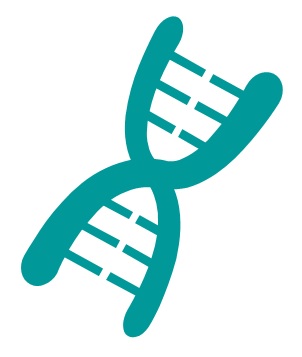gp100 (25-33) peptide – KVPRNQDWL
Activator of melanoma specific T-cells
gp100 25-33 (iedb ID 96518) is a peptide fragment 25 to 33 of the human melanoma antigen gp100 (glycoprotein 100) also nammed Melanocyte protein PMEL (UniProtKB: P40967). gp100 (25-33) is a H-2Db restricted epitope. gp100 (25-33) activate specific CD8+ T cells capable of recognizing B16 melanoma over other melanocytes. gp100 25-33 is a useful antigen for stimulation of specific T cells in T cell assays such as ELISPOT,ICS,proliferation assays…
Browse our antigen and immuno-control catalog here
Technical specifications
 |
Sequence : KVPRNQDWL |
 |
MW : 1155.31 Da (C52H82N16O14) |
 |
Purity : > 95% |
 |
Counter-Ion : TFA Salts (see option TFA removal) |
 |
Delivery format : Freeze dried in propylene 2mL microtubes |
 |
Other names : gp100 H-2 Db |
 |
Peptide Solubility Guideline |
 |
Bulk peptide quantities available
|
Price
| Product catalog | Size | Price € HT | Price $ USD |
| SB129-1MG | 1 mg | 77 | 96 |
| SB129-5MG | 5 mg | 270 | 337 |
| SB129-2*5MG | 2×5 mg | 385 | 481 |
| SB129-5*10MG | 5×10 mg | 1155 | 1443 |
References
J Exp Med . 1998 Jul 20;188(2):277-86. doi: 10.1084/jem.188.2.277
gp100/pmel 17 is a murine tumor rejection antigen: induction of « self »-reactive,tumoricidal T cells using high-affinity,altered peptide ligand
Many tumor-associated antigens are nonmutated,poorly immunogenic tissue differentiation antigens. Their weak immunogenicity may be due to « self »-tolerance. To induce autoreactive T cells,we studied immune responses to gp100/pmel 17,an antigen naturally expressed by both normal melanocytes and melanoma cells. Although a recombinant vaccinia virus (rVV) encoding the mouse homologue of gp100 was nonimmunogenic,immunization of normal C57BL/6 mice with the rVV encoding the human gp100 elicited a specific CD8(+) T cell response. These lymphocytes were cross-reactive with mgp100 in vitro and treated established B16 melanoma upon adoptive transfer. To understand the mechanism of the greater immunogenicity of the human version of gp100,we characterized a 9-amino acid (AA) epitope,restricted by H-2Db,that was recognized by the T cells. The ability to induce specific T cells with human but not mouse gp100 resulted from differences within the major histocompatibility complex (MHC) class I-restricted epitope and not from differences elsewhere in the molecule,as was evidenced by experiments in which mice were immunized with rVV containing minigenes encoding these epitopes. Although the human (hgp10025-33) and mouse (mgp10025-33) epitopes were homologous,differences in the three NH2-terminal AAs resulted in a 2-log increase in the ability of the human peptide to stabilize « empty » Db on RMA-S cells and a 3-log increase in its ability to trigger interferon gamma release by T cells. Thus,the fortuitous existence of a peptide homologue with significantly greater avidity for MHC class I resulted in the generation of self-reactive T cells. High-affinity,altered peptide ligands might be useful in the rational design of recombinant and synthetic vaccines that target tissue differentiation antigens expressed by tumors.
J Immunol May 15,2003,170 (10) 5188-5194
A Single Heteroclitic Epitope Determines Cancer Immunity After Xenogeneic DNA Immunization Against a Tumor Differentiation Antigen
Successful active immunization against cancer requires induction of immunity against self or mutated self Ags. However,immunization against self Ags is difficult. Xenogeneic immunization with orthologous Ags induces cancer immunity. The present study evaluated the basis for immunity induced by active immunization against a melanoma differentiation Ag,gp100. Tumor rejection of melanoma was assessed after immunization with human gp100 (hgp100) DNA compared with mouse gp100 (mgp100). C57BL/6 mice immunized with xenogeneic full-length hgp100 DNA were protected against syngeneic melanoma challenge. In contrast,mice immunized with hgp100 DNA and given i.p. tolerizing doses of the hgp100 Db-restricted peptide,hgp10025–33,were incapable of rejecting tumors. Furthermore,mice immunized with DNA constructs of hgp100 in which the hgp10025–27 epitope was substituted with the weaker Db-binding epitope from mgp100 (mgp10025–27) or a mutated epitope unable to bind Db did not reject B16 melanoma. Mice immunized with a minigene construct of hgp10025–33 rejected B16 melanoma,whereas mice immunized with the mgp10025–33 minigene did not develop protective tumor immunity. In this model of xenogeneic DNA immunization,the presence of an hgp100 heteroclitic epitope with a higher affinity for MHC created by three amino acid (25 to 27) substitutions at predicted minor anchor residues was necessary and sufficient to induce protective tumor immunity in H-2b mice with melanoma.
Induction of cancer immunity against self Ags can be difficult because of immune tolerance or ignorance. Immunity against a major class of self Ags,the differentiation Ags,can be induced by xenogeneic immunization,which is vaccination of a host from one species with DNA encoding an orthologous gene from another species (1,2,3,4). Differentiation Ags are shared between cancer cells and their normal cell counterparts (5). The strategy of xenogeneic immunization has been successful,whereas immunization with the syngeneic differentiation Ag failed to induce immunity. Although it has been presumed that individual amino acid sequence differences in the xenogeneic protein create heteroclitic epitopes,which trigger immunity against the homologous self protein,this hypothesis has not been directly demonstrated.
Prototypical examples of differentiation Ags are glycoproteins shared by melanomas and melanocytes,categorized as the melanosomal differentiation Ags (6). Immunity against differentiation Ags is a form of autoimmunity that can mediate destruction of tumors and normal tissues (1,2,3,4,7,8,9,10,11). In fact,tumor-infiltrating lymphocytes from patients with melanoma most often recognize melanocyte differentiation Ags (12). Previous studies have shown that xenogeneic immunization against the melanosomal differentiation Ags tyrosinase-related protein-1 TRP-1/gp75 (3,4),dopachrome tautomerase (1),and gp100/pmel 17 (2),either with DNA encoding the Ag or with recombinant protein,can result in the rejection of transplanted syngeneic melanomas in mice.
One mechanism that could mediate xenogeneic immunization is the creation of heteroclitic epitopes. A heteroclitic epitope describes an altered peptide that is a better agonist for inducing T cell responses than the native,unaltered peptide (13). This terminology has been applied to other altered peptides with a higher immunological potency than their unaltered counterparts (14,15,16). Heteroclitic peptides have increased potency either due to increased binding to MHC molecules (15,17,18,19) or to increased agonist properties to stimulate TCRs (16).
We recently described xenogeneic DNA immunization of mice with the gene encoding human gp100 (hgp100)3 (2). The gp100 Ag is a melanosomal differentiation Ag expressed by melanomas and melanocytes (20). In this model,mice are protected against melanoma challenge,and this immunity correlates with T cell reactivity against the MHC class I Db-restricted epitope gp10025–33. Immunity after xenogeneic immunization against gp100 was achieved in mice deficient in MHC class II molecules,suggesting that immunity directed against MHC class I epitopes was sufficient without T cell help. In the present study,we assessed the role of hgp10025–33 after xenogeneic DNA immunization. We show that hgp10025–33 is a heteroclitic epitope that is both necessary and sufficient to induce autoimmunity and melanoma immunity in an H-2b mouse tumor model.
gp100 quote request
Peptide synthesis service
SB-PEPTIDE can synthesize simple to complex peptides,individual to libraries of peptides and offers one of the largest catalog of modifications.
10 days express synthesis
SB-PEPTIDE offers a unique 10 days express peptide synthesis service. Contact us to assess the eligibility of your peptides.
